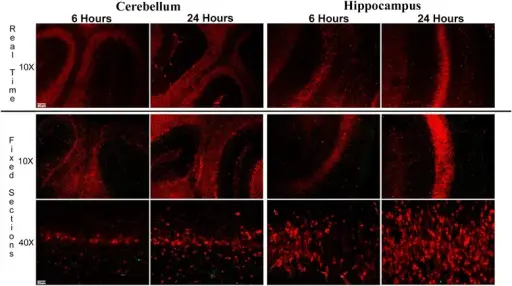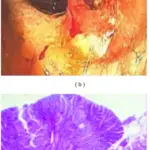
Real-time uptake of Cy5-conjugated anti-Ri immunoglobulin G in living cultures compared with uptake in parallel cultures following fixation at the same time points. In cultures studied in real time, Cy5 conjugated anti-Ri immunoglobulin (Ig)G was visible within multiple neuronal populations at 6 hours, with an increase in intensity of intraneuronal IgG by 24 hours, similar to observations with anti-Hu IgG. Uptake of Cy5-conjugated anti-Ri IgG in parallel cultures fixed following incubation with antibody were indistinguishable from that observed in slice cultures studied in real time, confirming that IgG uptake seen in fixed cultures accurately reflected events occurring prior to fixation. Neurons containing Cy5-conjugated anti-Ri IgG at both time points excluded SYTOX dyes, indicating that antibody uptake had occurred in living cells. Images are representative of real-time studies employing anti-Ri sera from two different patients, carried out in triplicate. Magnification bar indicates 20 μm.Neuronal uptake of anti-Hu antibody, but not anti-Ri antibody, leads to cell death in brain slice cultures.
Greenlee JE, Clawson SA, Hill KE, Wood B, Clardy SL, Tsunoda I, Jaskowski TD, Carlson NG - Journal of neuroinflammation (2014). Not Altered. CC.
Paraneoplastic syndromes that affect the central nervous system are rare disorders that are triggered by an altered immune system response to a neoplasm. They are defined as clinical syndromes involving nonmetastatic systemic effects that accompany malignant disease.
Paraneoplastic syndromes that affect the central nervous system include:
- Eye movement disorders
- Lambert-Eaton myasthenic syndrome
- Subacute cerebellar degeneration
- Limbic encephalitis


